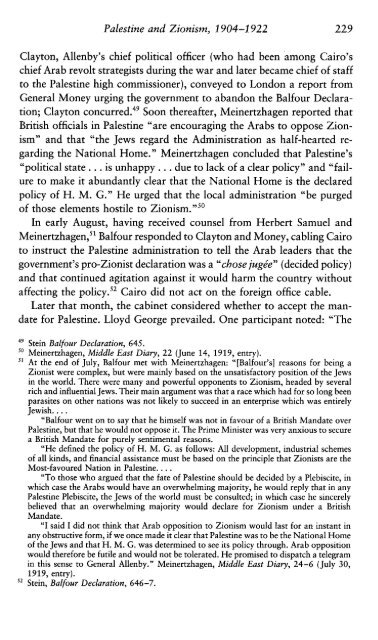Churchill, Palestine and Zionism, 1904-1922 - Douglas J. Feith
Churchill, Palestine and Zionism, 1904-1922 - Douglas J. Feith
Churchill, Palestine and Zionism, 1904-1922 - Douglas J. Feith
Create successful ePaper yourself
Turn your PDF publications into a flip-book with our unique Google optimized e-Paper software.
<strong>Palestine</strong> <strong>and</strong> <strong>Zionism</strong>, <strong>1904</strong>-<strong>1922</strong> 229<br />
Clayton, Allenby's chief political officer (who had been among Cairo's<br />
chief Arab revolt strategists during the war <strong>and</strong> later became chief of staff<br />
to the <strong>Palestine</strong> high commissioner), conveyed to London a report from<br />
General Money urging the government to ab<strong>and</strong>on the Balfour Declaration;<br />
Clayton concurred. 49 Soon thereafter, Meinertzhagen reported that<br />
British officials in <strong>Palestine</strong> "are encouraging the Arabs to oppose <strong>Zionism</strong>"<br />
<strong>and</strong> that "the Jews regard the Administration as half-hearted regarding<br />
the National Home." Meinertzhagen concluded that <strong>Palestine</strong>'s<br />
"political state ... is unhappy ... due to lack of a clear policy" <strong>and</strong> "failure<br />
to make it abundantly clear that the National Home is the declared<br />
policy of H. M. G." He urged that the local administration "be purged<br />
of those elements hostile to <strong>Zionism</strong>. ,,50<br />
In early August, having received counsel from Herbert Samuel <strong>and</strong><br />
Meinertzhagen,sl Balfour responded to Clayton <strong>and</strong> Money, cabling Cairo<br />
to instruct the <strong>Palestine</strong> administration to tell the Arab leaders that the<br />
government's pro-Zionist declaration was a "chose jugee" (decided policy)<br />
<strong>and</strong> that continued agitation against it would harm the country without<br />
affecting the policy.52 Cairo did not act on the foreign office cable.<br />
Later that month, the cabinet considered whether to accept the m<strong>and</strong>ate<br />
for <strong>Palestine</strong>. Lloyd George prevailed. One participant noted: "The<br />
49 Stein Balfour Declaration, 645.<br />
50 Meinertzhagen, Middle East Diary, 22 (June 14, 1919, entry).<br />
51 At the end of July, Balfour met with Meinertzhagen: "[Balfour's) reasons for being a<br />
Zionist were complex, but were mainly based on the unsatisfactory position of the Jews<br />
in the world. There were many <strong>and</strong> powerful opponents to <strong>Zionism</strong>, headed by several<br />
rich <strong>and</strong> influential Jews. Their main argument was that a race which had for so long been<br />
parasites on other nations was not likely to succeed in an enterprise which was entirely<br />
Jewish ....<br />
"Balfour went on to say that he himself was not in favour of a British M<strong>and</strong>ate over<br />
<strong>Palestine</strong>, but that he would not oppose it. The Prime Minister was very anxious to secure<br />
a British M<strong>and</strong>ate for purely sentimental reasons.<br />
"He defined the policy of H. M. G. as follows: All development, industrial schemes<br />
of all kinds, <strong>and</strong> financial assistance must be based on the principle that Zionists are the<br />
Most-favoured Nation in <strong>Palestine</strong> ....<br />
"To those who argued that the fate of <strong>Palestine</strong> should be decided by a Plebiscite, in<br />
which case the Arabs would have an overwhelming majority, he would reply that in any<br />
<strong>Palestine</strong> Plebiscite, the Jews of the world must be consulted; in which case he sincerely<br />
believed that an overwhelming majority would declare for <strong>Zionism</strong> under a British<br />
M<strong>and</strong>ate.<br />
"I said I did not think that Arab opposition to <strong>Zionism</strong> would last for an instant in<br />
any obstructive form, if we once made it clear that <strong>Palestine</strong> was to be the National Home<br />
of the Jews <strong>and</strong> that H. M. G. was determined to see its policy through. Arab opposition<br />
would therefore be futile <strong>and</strong> would not be tolerated. He promised to dispatch a telegram<br />
in this sense to General Allenby." Meinertzhagen, Middle East Diary, 24-6 (July 30,<br />
1919, entry).<br />
52 Stein, Balfour Declaration, 646-7.


